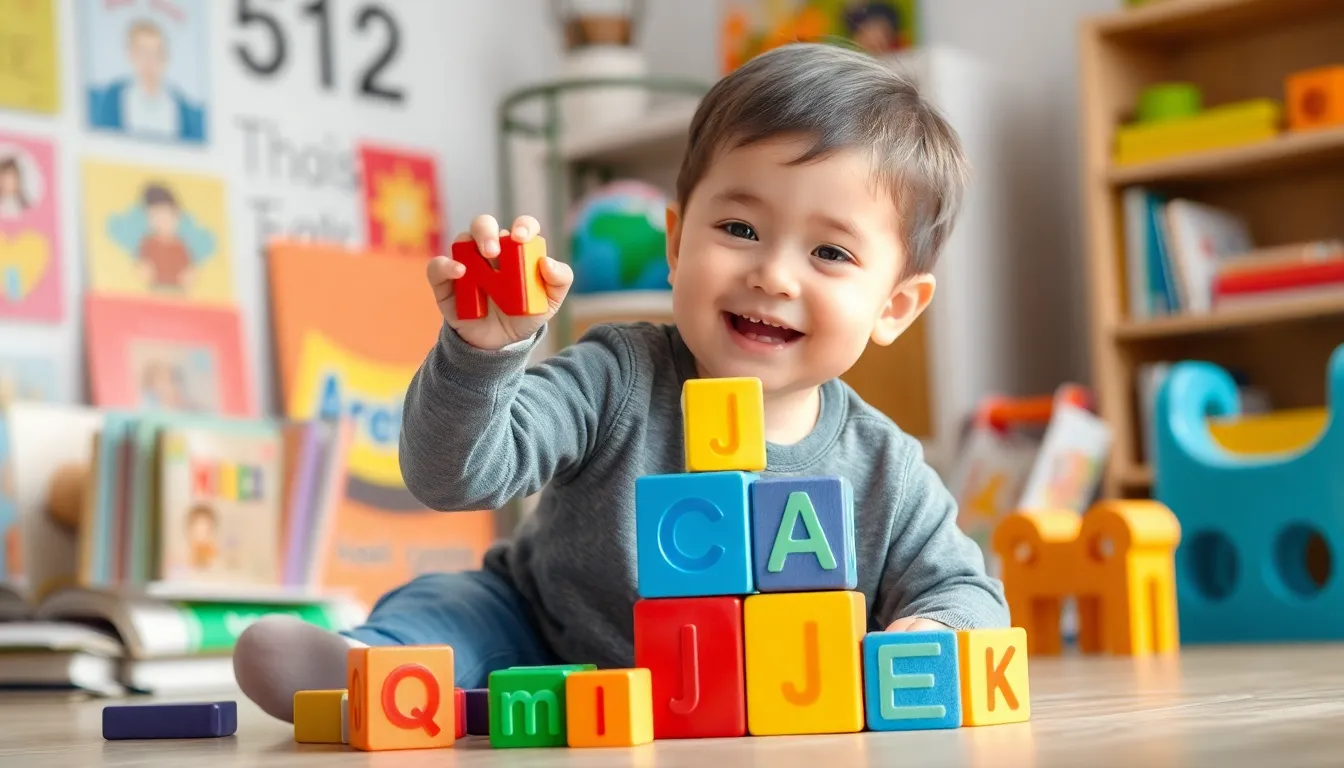Table of Contents
ToggleEarly literacy sets the foundation for a child’s future learning and development. It encompasses the skills and knowledge children acquire before they can read and write, shaping their ability to understand language and communicate effectively. As children engage with stories, songs, and letters, they build essential cognitive and social skills that pave the way for academic success.
In today’s fast-paced world, fostering early literacy is more important than ever. Parents, caregivers, and educators play a crucial role in creating rich language experiences that stimulate curiosity and a love for reading. By prioritizing early literacy, they not only enhance children’s language abilities but also ignite a lifelong passion for learning. Understanding its significance can empower families and communities to support young learners on their educational journeys.
Understanding Early Literacy
Early literacy encompasses the foundational skills and knowledge that children develop before attaining reading and writing abilities. These skills significantly impact cognitive and social development.
Definition of Early Literacy
Early literacy refers to the set of skills that precede formal reading and writing. It includes language development, print awareness, phonological awareness, and vocabulary growth. Children acquire these skills through interactions with caregivers and exposure to various literacy experiences, such as storytelling, singing, and reading aloud.
Importance of Early Literacy
Early literacy plays a crucial role in a child’s overall development. It fosters cognitive skills necessary for academic success and enhances social interactions and communication abilities. Research indicates that children who engage in early literacy activities display improved reading comprehension and critical thinking as they grow. Furthermore, strong early literacy skills promote lifelong learning habits, instilling a love for reading that persists throughout life. By prioritizing early literacy, families and communities contribute to the future success and well-being of young learners.
Components of Early Literacy

Early literacy consists of various components that contribute to a child’s reading and writing capabilities. Key elements include phonemic awareness, vocabulary development, and reading comprehension.
Phonemic Awareness
Phonemic awareness involves recognizing and manipulating sounds in spoken words. It serves as the foundation for reading, as children learn to identify individual sounds (phonemes) within words. Activities such as rhyming, sound matching, and segmenting words into their component sounds enhance phonemic skills. Engaging children in these activities fosters sound recognition, which strengthens their ability to decode words when they begin reading.
Vocabulary Development
Vocabulary development focuses on enhancing a child’s word knowledge. A robust vocabulary enables effective communication and comprehension. Parents and educators can promote vocabulary growth by reading aloud, introducing new words during conversations, and discussing word meanings in context. Engaging children in various literary genres exposes them to diverse vocabulary terms, enriching their language skills and enhancing their ability to express themselves clearly.
Reading Comprehension
Reading comprehension encompasses the ability to understand, interpret, and analyze text. This skill is crucial for academic success and everyday communication. Strategies like asking questions, making predictions, and summarizing texts support comprehension development. Encouraging discussions about stories read provides opportunities for children to think critically and articulate their thoughts, further enhancing their understanding and retention of information.
Strategies to Promote Early Literacy
Effective strategies can greatly enhance early literacy skills in children. These methods involve interactive experiences, phonics, and play, fostering a robust foundation for reading and writing.
Interactive Storytelling
Interactive storytelling engages children actively, making stories more memorable. Using question prompts during reading encourages children to predict outcomes and express ideas. Employing sound effects and gestures adds excitement, further capturing children’s attention. Involving children in retelling stories helps strengthen their comprehension and narrative skills. Incorporating diverse storytelling formats, such as puppetry or visual aids, broadens children’s understanding and stimulates imagination.
Phonics-Based Approaches
Phonics-based approaches focus on the relationship between letters and sounds. Teaching children letter recognition and sound combinations aids in decoding words. Activities like phonics games and songs can make learning enjoyable. Utilizing flashcards, worksheets, and interactive digital tools reinforces these skills. Integrating phonemic awareness drills, such as blending and segmenting sounds, promotes a deeper understanding of phonetics. Regular practice ensures a strong foundation for reading success.
Play-Based Learning
Play-based learning encourages exploration and creativity, essential for early literacy. Incorporating literacy-related games, such as word puzzles and building blocks, fosters language development. Dramatic play scenarios allow children to act out stories, enhancing their comprehension and vocabulary. Providing books in various settings, like play areas or outdoor spaces, promotes spontaneous reading experiences. Encouraging peer interactions during play supports social skills and shared language use, creating a rich environment for literacy growth.
Role of Parents and Educators
Parents and educators play a crucial role in fostering early literacy, providing the support and resources necessary for children’s developmental success. Their involvement significantly influences language skills, comprehension, and a lifelong love for reading.
Supportive Home Environment
A supportive home environment encourages early literacy through daily interactions. Parents can incorporate reading into routines by setting aside specific times for storytime. Creating a literacy-rich environment includes having access to books, engaging in conversations, and model reading behaviors. Using everyday activities, like cooking or shopping, to introduce new vocabulary enhances learning. Playing sound-based games, such as rhyming or word matching, strengthens phonemic awareness. Engaging children in discussions about their favorite stories deepens comprehension and critical thinking.
Classroom Practices
Effective classroom practices enhance early literacy through structured and engaging activities. Educators can implement daily reading components, such as read-aloud sessions, where they model fluent reading and expression. Employing phonics-based approaches helps children understand sound-letter relationships through interactive lessons. Incorporating play-based learning activities, such as literacy games and role-playing, promotes creativity while reinforcing comprehension and vocabulary. Establishing a print-rich classroom environment with labels, charts, and diverse reading materials supports independent exploration. Regularly assessing students’ literacy skills ensures personalized support, allowing for targeted interventions that address specific needs.
Early literacy is a cornerstone of a child’s development that shapes their future learning and communication skills. By engaging in literacy-rich activities and fostering supportive environments, parents and educators can significantly enhance children’s language abilities and ignite a lifelong love for reading. The collaborative efforts between home and school create a powerful foundation for cognitive and social growth. As children build essential skills such as phonemic awareness, vocabulary, and comprehension, they not only prepare for academic success but also develop critical thinking and creativity. Investing in early literacy today paves the way for a brighter future for children and their communities.





